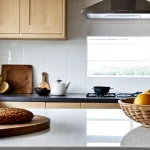Cutting-edge UK Kitchen Appliances Shaping Sustainable Cooking
The rise of energy-efficient kitchen appliances is transforming how UK households approach sustainable cooking. Modern innovations like energy-efficient ovens and induction hobs reduce power consumption without compromising performance. Induction hobs, for example, use magnetic fields to directly heat cookware, resulting in faster cooking times and less wasted energy compared to traditional electric or gas stoves.
Smart refrigerators in the UK now come equipped with sensors that monitor usage patterns, adjusting cooling cycles to optimise energy use. Integrating these appliances with UK cooking technology such as smart home systems allows users to remotely control and schedule appliance operation. This integration prevents unnecessary energy drain, cutting costs and carbon footprints simultaneously.
Have you seen this : Top-rated uk kitchen gadgets: discover the best user-reviewed products
A notable case study from a London household demonstrated a 20% reduction in electricity usage within six months of switching to smart, energy-efficient appliances and linking them to their home automation platform. This example highlights the tangible benefits of adopting sustainable kitchen design elements.
In conclusion, adopting energy-efficient ovens, induction hobs, and smart refrigerators, combined with smart home integration, provides a practical path for UK consumers toward more sustainable, cost-effective cooking. This synergy between technology and design is key to reducing household energy consumption while enhancing daily cooking experiences.
Also to read : Choosing the best energy-efficient appliances for your uk kitchen: a complete guide
Eco-friendly Materials and Sustainable Design Trends
The shift toward eco-friendly kitchen materials is gaining momentum in the UK, reflecting growing consumer demand for sustainability. Many manufacturers are now adopting recycled kitchen products such as reclaimed wood and repurposed metals. These materials reduce waste and the need for virgin resources, aligning with sustainable practices.
Sustainable kitchen design often incorporates natural and renewable resources like bamboo and sustainably harvested timber. Bamboo is prized for its rapid growth and durability, making it an excellent choice for kitchen surfaces and cabinetry. Additionally, low-VOC (volatile organic compound) finishes ensure healthier indoor air quality, reducing environmental toxins without compromising aesthetics.
Modular kitchen designs further advance sustainability by allowing components to be replaced or upgraded individually rather than discarding an entire kitchen setup. This approach minimizes waste and extends the lifespan of kitchen fittings, ultimately lessening the environmental footprint. By combining recycled materials, sustainable timber, and thoughtful design, modern kitchens can achieve both functionality and eco-consciousness.
Innovations in Food Waste Reduction and Recycling
In recent years, kitchen waste reduction has seen impressive advancements driven by technology and sustainable cooking practices. One notable innovation is the introduction of home composting units. These systems transform food scraps into nutrient-rich compost, enabling households to recycle organic waste efficiently. Paired with integrated recycling systems, they create a seamless process to minimize landfill contributions.
Smart bins now play a vital role in promoting food recycling technology. Equipped with sensors, these bins monitor the amount and type of waste, helping users track their disposal habits. Accompanying smartphone apps provide real-time feedback on kitchen waste reduction, offering recipe suggestions based on remaining ingredients and reminding users of expiry dates to prevent spoilage.
UK households have embraced these circular kitchen practices enthusiastically. By adopting smart bins and apps, many are effectively reducing waste and turning cooking into a more mindful, sustainable activity. These solutions not only lessen environmental impact but also encourage economical food management, proving that sustainable cooking practices are achievable and practical within everyday life.
Meeting UK Green Standards in Kitchen Innovation
Understanding sustainability benchmarks for modern kitchens
Achieving compliance with UK green kitchen standards requires adherence to clearly defined regulations and eco-certifications that promote environmental responsibility. Key frameworks such as BREEAM (Building Research Establishment Environmental Assessment Method) and FSC (Forest Stewardship Council) play a pivotal role in setting the benchmark for kitchen sustainability. BREEAM assesses the environmental impact of building design and materials, while FSC ensures that sourced timber meets strict criteria for responsible forestry management.
Manufacturers aiming for eco-conscious kitchen designs often seek certifications like these to demonstrate commitment to sustainability. Brands recognised under these standards typically prioritise renewable materials, energy-efficient appliances, and low-VOC (volatile organic compounds) finishes to reduce indoor air pollution. This aligns their products with the UK’s sustainable kitchen regulations, offering reassurance to consumers seeking eco-friendly options.
For homeowners, practical steps to create a certification-ready kitchen include selecting FSC-certified wood for cabinetry and flooring, integrating energy-saving appliances, and utilising sustainably harvested composite materials. Additionally, correctly disposing of packaging and choosing suppliers with transparent environmental policies further supports meeting UK green kitchen standards. By aligning choices with these principles, homeowners can contribute meaningfully to broader sustainability goals while upgrading their kitchens.
Practical Tips for Creating a Sustainable UK Kitchen
Creating a sustainable kitchen in the UK begins with identifying upgrades that deliver the greatest environmental impact right away. Prioritise energy-efficient appliances, such as A++ rated ovens and refrigerators, which significantly reduce electricity consumption. Installing LED lighting also cuts down energy use while brightening your cooking area. Consider water-saving taps to lower water wastage during food preparation and cleaning.
Everyday habits play a vital role in fostering a sustainable cooking environment. Simple changes, like using reusable cloths instead of paper towels and cooking with lids on pots to conserve heat, can cumulatively reduce your kitchen’s carbon footprint. Additionally, switching to eco-friendly cleaning products free from harsh chemicals supports both your health and the planet.
UK eco kitchen solutions often include smart waste management, with separate bins for compostable food waste and recyclables encouraging responsible disposal. Many British households are adopting ingredient sourcing from local suppliers and farmer’s markets, reducing food miles and supporting sustainable agriculture.
To inspire your kitchen makeover, look to UK homes pioneering sustainable kitchen innovation: they exemplify how practical choices—energy-star appliances, efficient water use, and conscious lifestyle shifts—create an eco-friendly kitchen that doesn’t compromise on style or functionality. Embracing these sustainable kitchen tips will empower you to contribute positively to the environment every day.

